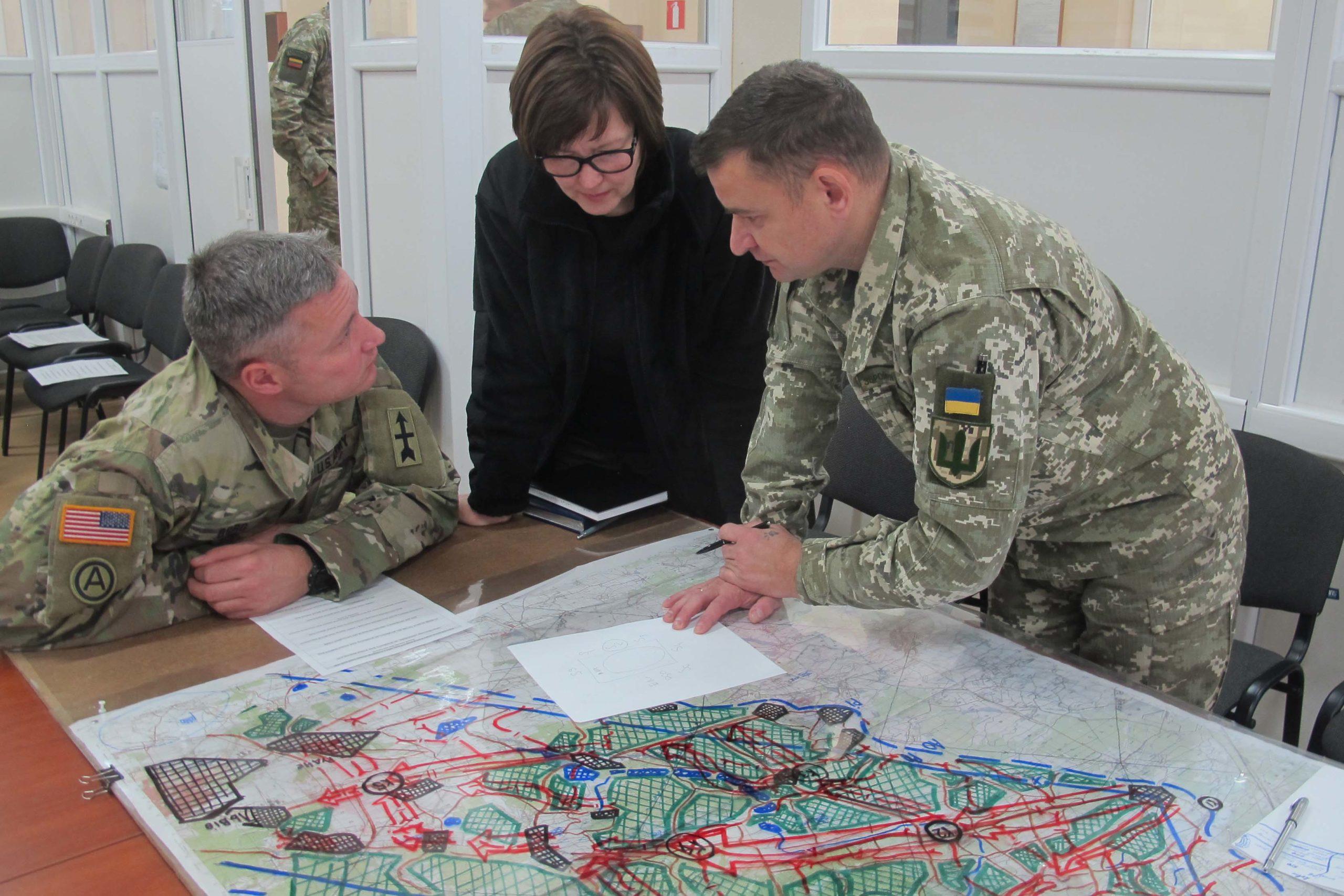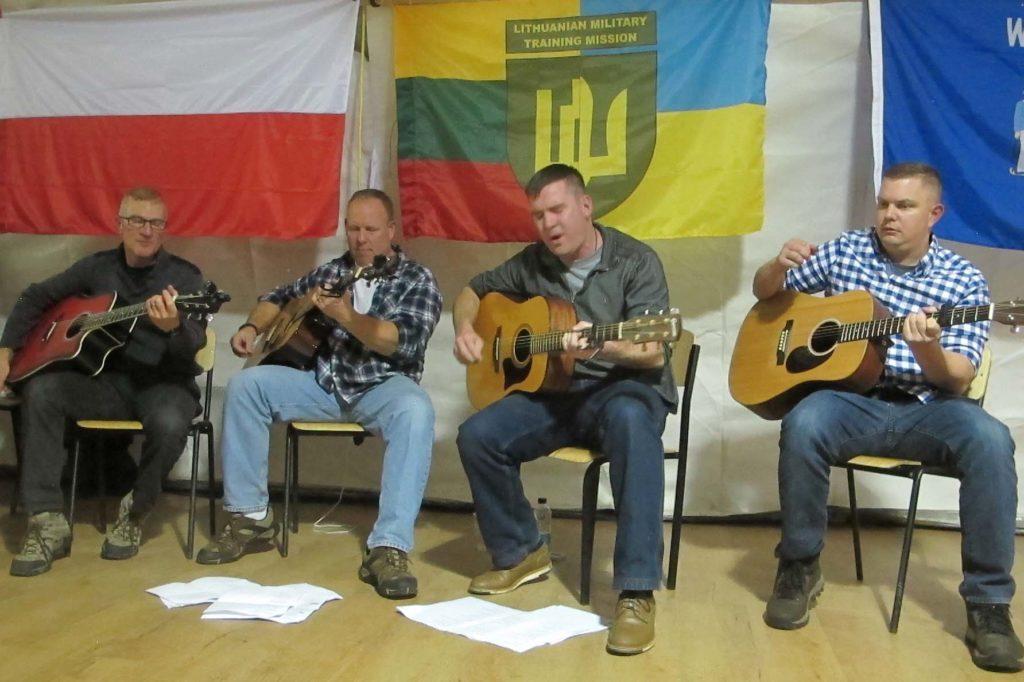
The Ukrainian military base known as the Combat Training Center stands at the end of a road riddled with potholes in a quiet stretch of forest and marshland lined with fluffy cattails. For the next nine months, the base in Yavoriv, Ukraine will be home for more than 150 members of the Wisconsin National Guard helping train Ukraine's military.
Men and women from Wisconsin are joined here by soldiers from Canada, Lithuania, and Poland, who are all working together to help train Ukraine's military to work directly with NATO.
The United States has provided $1.5 billion in military aid to Ukraine since the country's war with Russia-backed separatists started in 2015. That military assistance helps buy rifles, medical supplies, and other items. It also supports the U.S. troops stationed in Ukraine.
Although military aid to Ukraine has become entwined with the U.S. impeachment inquiry into President Donald Trump, soldiers here say politics in Washington haven't changed the mission in Ukraine.
"The political disruption that's going on doesn't affect our day to day operations, and it doesn't affect our relationship with our multinational partners, " said Lt. Col. Daniel Walsh of the Wisconsin Guard.
The base — formally known as the International Center for Peacekeeping and Security — stands hundreds of miles away from the war in Ukraine's east. The base is far closer to Poland, just a short drive away, than the war front. But what happens here is a key part of both Ukraine's war efforts and the U.S. aid effort to the country.
A collaborative process
Many of the U.S. soldiers in Yavoriv have done previous tours in places like Iraq or Afghanistan. But this mission in Ukraine is markedly different.
"In Iraq, we had weapons 24/7. Go to the bathroom; guess what's coming with you," said Maj. Kathrine Berberich of the Wisconsin Guard as she walked unarmed around the base in Yavoriv.
Behind Berberich, a group of puppies born on the base frolicked by a line of olive green tanks. About a dozen dogs - mostly strays - have wandered onto the base and been taken in by soldiers. A sign on the base asking for donations to buy the dogs anti-flea treatments and rabies vaccinations shows pictures of adopted dogs with names like Socks and Sergeant Major. It notes that a black dog with light brown paws named Shoes is "not a big fan of hugs."
Although Ukrainian troops do take part in battlefield exercises in Yavoriv, complete with demolitions and artillery fire, they also spend a lot of time in classrooms learning about subjects like NATO procedures in a potential battle. Ukraine's military is currently working to achieve full "interoperability" with NATO. The U.S. soldiers are in Yavoriv to help the Ukrainians meet that goal.

On a recent afternoon, an interpreter helped American and Ukrainian soldiers communicate as they stood bent over a map showing a potential battlefield scenario. Working to strengthen the armed forces of U.S. allies is a huge part of what the U.S. military does overseas, Lt. Col. Walsh said.
"I think it's in America's interest to promote democracy," Walsh said. "Ukraine is a fledgling democracy, and our job is to work with their military to help them achieve their political goals."
The Wisconsin National Guard is the eighth group of U.S. soldiers who have rotated through Ukraine and worked with the Ukrainian military since 2015.
Col. Michael Hanson, the Deputy Commanding Officer in Yavoriv, said that U.S. military aid is a collaborative process between American and Ukrainian soldiers.
"What we try to do is sit down with them and say, 'What do you need? What does your army want?'" Hanson said. "And then we're using our expertise to help teach that."
In addition to becoming interoperable with NATO, Ukraine has also sent strong signals that it wants to eventually become a NATO member.
President Trump has criticized NATO for placing an unfair financial burden on the U.S. and pressured other member states to increase their defense spending. Col. Hanson, speaking about the mission here in Ukraine, said the sort of work that the U.S. military does in countries like Ukraine brings a great return on the financial investment that ultimately helps bolster U.S. security.
"We are a nation that only has so much money, so we can only have a certain size military," Hanson said. "However, by being out here and building these partnerships, we've now taken a million-man army and turned it into a two-million-man army, and we're not even funding the other million people."
Mission stresses mentorship and relationships
The Ukraine mission has been an eye-opening experience for some lower-ranking soldiers from the Wisconsin Guard, many of whom are in their early 20s and have never left the United States before.
"People from my generation in Ukraine want to fight for their country," said Payton Wehr, a 22-year-old driver from Wisconsin, referring to the young Ukrainian soldiers fighting in the country's war and the youth who took part in Ukraine's 2014 Maidan street revolution in Kyiv that ousted former president Victor Viktor Yanukovych.
"It's been really empowering to see firsthand how people my age are working really hard to make a difference in Ukraine," Wehr said.
Wehr befriended local Ukrainians on the base after asking them questions like where to get a good haircut or spray tan in this rural part of western Ukraine. She said the mission fundamentally changed how she thinks about the military's work abroad and her career going forward.
"Our military does a lot more than combat deployments," Wehr said. "A lot of the focus is supporting other countries."
U.S. soldiers in Yavoriv stress the importance of mentorship and relationships with Ukrainian soldiers. On a recent evening, some members of the Wisconsin Guard played a blues concert for Polish and Lithuanian soldiers who would soon be leaving. The chords of "Sweet Home Chicago" reverberated from inside a large tent decorated with a Green Bay Packers flag, as an international group of soldiers sat on folding chairs, some drinking beer, and the musicians played.
"We're so grateful to the American instructors for everything they do here," said one Ukrainian soldier. "We love you," he added.
This story was produced by the American Homefront Project, a public media collaboration that reports on American military life and veterans. Funding comes from the Corporation for Public Broadcasting.
Copyright 2020 North Carolina Public Radio – WUNC. To see more, visit North Carolina Public Radio – WUNC.

9(MDEyMDcxNjYwMDEzNzc2MTQzNDNiY2I3ZA004))








